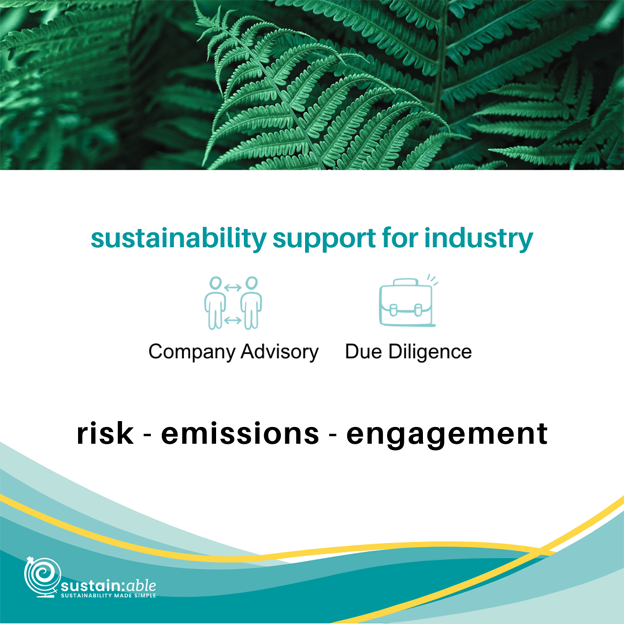
With a background in oil and gas and the wider energy industry, and a focus on providing Environmental, Social, and Governance (ESG), emissions and Net Zero advice, we asked sustain:able some of our most pressing questions.
1. Can you provide an overview of your approach to helping clients reduce emissions and achieve sustainability goals?
We pride ourselves on providing technically-focussed, pragmatic advice to the extractive industries. Our team have all worked in the oil & gas, mining, and low carbon energy sectors previously including as geologists, engineers and commercial specialists, so we understand the challenges that companies in these sectors face.
We work with our clients from wherever they currently are on their ESG and emissions journey, whether they are just starting or need targeted support on a particular issue.
Our common workflow includes:
- Assess current status and challenges – asking WHY they want help in this area and what they are trying to achieve.
- Establish the baseline – what does their existing data telling us? How does the company compare to peers and best practice?
- Develop fit-for-purpose solutions – design a robust, data-supported emissions reduction and ESG strategy tailored to their operations and challenges, including technology mapping, capacity building and training, monitoring and reporting.
- Implementation – an ESG strategy is only useful if it is integrated across the business - we define a roadmap outlining actions, timelines, responsibilities and resources required to achieve the client’s goals.
- Continuous Improvement – emissions reduction and ESG risk management are ongoing processes so we look to work with the client over a longer time period to get the best results.
2. Why should companies have an ESG and emissions reduction strategy?
The pressures on extractives companies are increasing from all areas; banks, shareholders, employees, regulators and the public. Demonstrating a wider, systemic approach to ESG principles is now an essential and strategic imperative for companies.
The term “ESG” has been getting some bad press recently, however this is predominantly directed at so called “green” investment funds. For us, “ESG” is essentially risk management, with environmental, social and governance pillars providing a way to group and focus efforts across a wide range of topics.
By proactively managing ESG risks companies can reduce the likelihood of regulatory non-compliance as well as reputational damage and financial losses associated with adverse events.
By aligning business practices with ESG considerations, companies position themselves for resilience in a rapidly changing business landscape
3. What are some ways in which you played a significant role in helping a client achieve substantial emissions reductions or environmental improvements?
Emissions mitigation during development planning – we work with a number of clients during the planning of oil and gas developments. Detailed evaluation of the Field Development Plan and engagement with the engineering teams at the planning stage enables options for emissions reduction and energy efficiency to be “baked in” from the start rather than trying to retro-fit later.
Scope 3 emissions – calculating scope 3 emissions can be a really overwhelming task, so we’ve developed a workflow to help our clients through this; increasing understanding of what their scope 3 emissions are, which categories of scope 3 are most relevant, what calculation methods are most appropriate and how data collection can be improved.
Biodiversity and TNFD – we are one of the first consultancies to conduct a pilot study using the new TNFD (Taskforce on Nature-related Financial Disclosures) for a North Sea Operator. The company has used this to build biodiversity resilience, to support internal decision-making and feed into discussions with regulators and banks. We are really passionate about helping companies understand not only their potential impacts on nature but also the opportunities they have to improve the biodiversity around their activities. This is a really exciting, rapidly growing area, that we are enjoying getting more involved with.
Supply chain resilience – supply chains are under increasing ESG and emissions scrutiny right now. We help clients map their supply chains and conduct materiality assessments to focus on the parts of the supply chain that are most critical. Other work involves determining requirements from off-takers / customers to secure contracts, define performance metrics, and working with supply chain partners to improve data collection.
Benchmarking – companies are always keen to see how they compare to their peers so we regularly conduct benchmarking exercises for clients, ensuring comparisons to the most recent information. This includes emissions of oil and gas imports versus domestic production, emissions reporting by peers, material ESG topic reporting and frameworks in use. Many of these studies are carried out for banks and lenders giving us a unique view of what they are looking for when reviewing companies for investment.
4. Framework reporting is becoming more complex. How do you help companies to navigate the various reporting requirements?
When companies first look at any reporting requirement, i.e. TCFD, GRI, SASB, CSRD, they are often overwhelmed with the amount of work required. Once there is agreement on which of the frameworks are most suitable for them, we provide a ‘recipe book’ for companies to follow which breaks down reporting requirements into manageable chunks that are aligned with their company activities.
Many companies are often already doing far more than they realise in the ESG space. Sometimes it’s more a case of helping them pull everything together and ensure they have a cohesive and impactful approach across their activities that can then be easily communicated.
5. Many industries are setting ambitious net-zero emission targets. How do you guide your clients in setting and working toward these targets, and what challenges do they typically encounter?
Net Zero claims are coming under increasing scrutiny, and for the hard-to-abate sectors it is extremely challenging to achieve Net Zero in a technically rigorous way. It’s essential companies have a clear understanding of their current emissions before they define an ambitious but achievable plan for reduction.
We encourage clients to be very careful of the language they use for public claims – there are a lot of relatively new terms that are not always used in a rigorous way. For example, “alignment with Paris goals” means rapid and deep emissions reductions with interim goals to limit temperature rise to well below 2 degrees Celsius above pre-industrial levels. To achieve this, emissions must peak within the next few years and decline thereafter up to 2050. If a company’s net zero targets and pathway are not consistent with this, then they risk exposure to accusations of greenwashing or even litigation if they claim alignment with Paris goals.

6. What is your vision for sustain:able over the next 12 months/few years?
The sustainability space and how it fits within the energy transition focus is a really exciting place to be right now with so many opportunities – we want to make a real difference and help companies to navigate the challenges and opportunities.
We already have a brilliant global portfolio of clients and we are seeing a lot of increased work in the Middle East, Australia and Africa. We want to continue to grow our work in these areas, building on our project experience.
Mining is a key growth area for us as it is so integral to the energy transition. There is a huge amount that can be done in the mining industry and we would love to do more with our existing, and hopefully some new, mining clients. To date our work in mining has been very focussed on the supply chain and we definitely see this getting busier.
We have also launched a new service offering focused on maritime and shipping which is exciting. We have been working in this area for a while through our clients who have large offshore portfolios so feel this is a natural area for us to grow into.
And finally, we have started to look at how we can offer some of the tools and processes we have designed and utilise in-house, directly to our clients. This includes our new Wayfinder tool which we recently launched on our website so do take a look!
Summary:
Incorporating ESG principles and striving for continual improvement in impact and emissions reduction is not only the right thing to do from an ethical standpoint but is now a strategic imperative too.
Management of ESG and emissions risk can be a challenging mountain to climb, but it is crucial for companies to make a start, even if it isn’t perfect, to drive positive change, create value and ensure the essential energy our society needs is delivered in a responsible manner.
sustain:able
Formed by Dr Rachel Gavey and Dr Rosalie Constable, sustain:able is an ESG consultancy focused on finding a balance to the energy trilemma and ensuring access to clean water. The principals have a background in geoscience and engineering, and bring over 50 years of combined experience in the global energy and extractive industries.
Rachel has a PhD in Marine Geology, a BSc in Geological Oceanography and has many years experience working in the energy industry around the globe in technical roles and leading complex projects. Technology forms the centre of all Rachels’ projects; she is incredibly passionate about the smart use of technology for solving problems, especially when those problems relate to the energy transition.
Rosalie has a PhD in Earth Science from the University of Adelaide and over 20 years’ working in various technical, asset management and team leader roles in the oil and gas industry.
KeyFacts Energy Industry Directory: sustain:able
 KEYFACT Energy
KEYFACT Energy